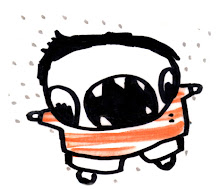
Conrad Slater (left) and "Podcast" Paul (right) observing BBC Television Centre in April sunlight | A group of UK podcasters spent two hours in deep in the bowels of BBC Television Centre yesterday discussing UK podcasting. Chris Vallance of Radio Five Live's Pods and Blogs invited British podcasters to discuss podcasting, broadcasting and where the two might meet up.
We were joined by Rhod Sharp, host of "Up All Night", BBC radio producer Dominic Laurie, and Rebecca Myatt from World Service Outlook who expressed her interest in finding podcasts for their audience of 140 million. |
Present at this historic event were a mixture of podcast producers from businesses deriving income to passionate enthusiasts, all reporting rapidly quickening growth in the podcast phenomenon, which was attributed partly to the BBC's recent promotion of podcasting. There are well over 250 active UK podcasters right now and it was acknowledged that it is beginning to emerge as a source of talent with new ideas and voices emerging.
Inital talk was about the freedom and independence enjoyed by the podcasters as opposed to the relatively tight restrictions which apply to BBC podcasters. Rhod Sharp described podcasting as being "six feet under the totem pole" as far as the BBC were concerned. Paul Pinfield made the point that the BBC set globally acknowledged standards. Chris Vallance played some podcasts from Germany and Pakistan, making the point that these were genuine voices, untouched by editorial considerations or censorship, and speaking in a natural way that non-broadcasters use.
There was discussion about how the BBC is set up to respond to and deal with citizen-submitted media from mobile phones, etc, with the example given of images coming in from July 7th London bombings. The BBC podcast "experiment" was debated, and issue of MCPS-PRS podcast license was raised, the BBC not yet aware that such a license exists. Rhod Sharp commended the
Creative Commons concept as a flexible and easy to understand licensing system for UK citizens which could be easily adopted.
What made podcasting different was it's genuineness and intimacy, said Janet Parkinson from Flashing 12, a self-confessed hobbyist. Responding to emails and having interaction with your audience was crucial, she said. UK podcasting output is distinctive, has good production values, and does well internationally, observed Neil Dixon. The Britcaster forum which he runs was was intelligent and remarkably "troll free"; he acknowledged that he had to deal with spurious entries to his British listing from people who wanted to be in the "British only" listing and noted one new addition per day. Paul Pinfield who spoke of his interest in the business side of podcasting and offered his view that podcasting would soon replace local radio, which was "total crap". There was strong group of music podcasters present.
Dean Whitbread talked about the empowerment of podcasting, where the writer producer and editor has the advantage of being able to vary formats and combine media in original ways, adding different kinds of material to the same RRS feed. I asked whether an independent podcast used by the BBC would automatically be covered by existing BBC agreements regarding music licensing - the consensus was yes, it would be. Mark Crook pointed out that as podcasting was now on school curriculums, we could expect to see more young people becoming podcasters as they learn to use the tools.
As the discussion ended, the quietly smiling 23 year old
Phil "Bitjobs" from Birmingham was spirited away into the bowels of BBC "looking for somewhere domestic" to shoot for a TV interview.
After the meeting we were joined by filmmaker Conrad Slater, and
Adrian Pegg, as the debate re-convened in local Shepherds Bush pub the Defector's Weld for a Britcasters get-together. The jolly-up centred around the benign figure of Neil Dixon who set up the
Britcaster forum one year ago. In this recording, Chris Vallance interviews the assembled podcasters, as with multiple recording devices, they record him interviewing them. At one point Podcast Paul's microphone is clipped to a pint of beer, and my Sony Minidisc recorder is balanced on a sauce bottle.
There is widespread praise for Roger Smalls, Neil Dixon describes himself as the Daddy and confesses to many moods,
Podcast Paul admits that UK Podcasters are Radio Caroline,
Paul Pinfield talks business and praises Vobes, Deek Deekster gives bandwidth and expresses his pleasure in finding
folk music in urban Isington,
Janet describes her fascination for podcasts from other countries for learning about other cultures, as global podcast culture emerges - her magazine Podcast User has been going three months and is now being downloaded in 80 countries. In the longer version,
Conrad Slater talks about and demonstrates the creative use of a small stereo condenser microphone.
Edited interview - 14:49Unedited interview - 19:24
 On Tuesday 26th April, World Intellectual Property day, UK podcaster Dean Whitbread contributed to a seminar organised by QUT Law Faculty's Intellectual Property: Knowledge, Culture, and Economy Program, in conjunction with the ARC Centre of Excellence for Creative Industries and Innovation. This groundbreaking event took place in Second Life, the online multiplayer virtual world created by Linden Labs and was entitled:
On Tuesday 26th April, World Intellectual Property day, UK podcaster Dean Whitbread contributed to a seminar organised by QUT Law Faculty's Intellectual Property: Knowledge, Culture, and Economy Program, in conjunction with the ARC Centre of Excellence for Creative Industries and Innovation. This groundbreaking event took place in Second Life, the online multiplayer virtual world created by Linden Labs and was entitled:  The participants were able to interact using Second Life's self-designed avatars and TeamSpeex, an audio conferencing application which enabled most of the assembled participants to speak to and hear each other in real time.
The participants were able to interact using Second Life's self-designed avatars and TeamSpeex, an audio conferencing application which enabled most of the assembled participants to speak to and hear each other in real time. Speakers included:
Speakers included:




